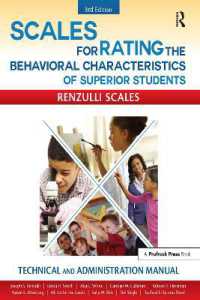- ホーム
- > 洋書
- > ドイツ書
- > Social Sciences, Jurisprudence & Economy
- > Education Science / Pedagogic
- > didactics, methodics, school education
Full Description
This edited volume demonstrates how an educational linguistics approach to inquiry is well positioned to identify, examine, and theorize the language and literacy dimensions of refugee-background learners' experiences.






